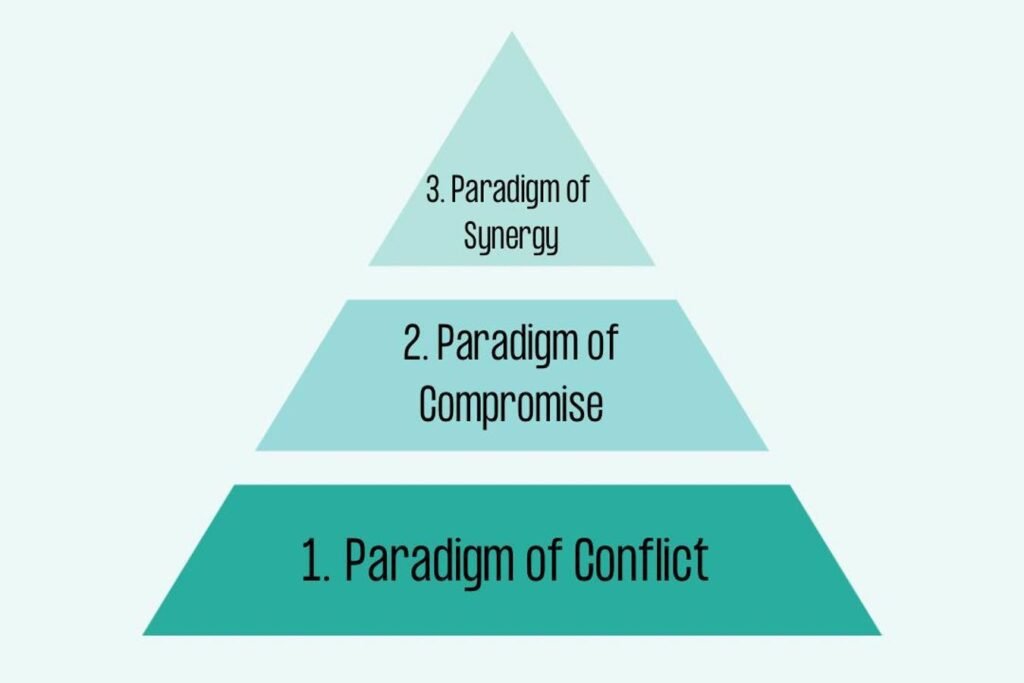The third street triangle
The world is on the precipice of massive change as we face the existential challenges of the climate crisis and a new definition of the role and purpose of humans brought about by artificial intelligence. We are at the crossroads of an unimaginable transformation that requires a new level of human cooperation.
I have tried to articulate a very simple framework based on Spiral Dynamics that explains the transformative journey we take from conflict, compromise and finally to the peak of synergy. The framework, which I have called “The Third Way,” represents what I see as the only feasible approach to addressing the urgent and existential challenges facing our generation.
I have distilled this framework into three examples, which I describe below.
1. The Conflict Paradigm: A Stalemate of Beliefs
In this scenario, two parties hold opposing views: they disagree and leave their original views intact. Imagine two neighbors fighting over a piece of land. They are deeply entrenched in their view, believing that their claim to the land is the only valid one. They engage in heated arguments, with neither side willing to listen or empathize with the other’s perspective. The dispute escalates, possibly leading to court battles or continued enmity. No resolution is reached, and both parties remain unhappy, as the land itself is potentially neglected or becomes a symbol of their conflict, often leaving bitter memories that are likely to be passed down through generations.
2. The Compromise Paradigm: Settling for Less
Two parties with opposing views listen to each other’s opposing views and come up with a compromise they can both live with, yet end up worse than their original solution. Here, the neighbors recognize the need to find some middle ground. They participate in discussions and negotiations, each presenting their case. Eventually, they agree to divide the land, each getting a share. Both feel they have given up more than they wanted, leading to a disappointing acceptance rather than a genuine resolution. The land is divided, but none of the neighbors are really happy with the result. This is the definition of lose-lose in the sense that both parties have to give up something to reach a middle ground, leaving neither party truly satisfied. Compromise can be a curse as it can often create unintended consequences further down the line.
3. The Synergy Paradigm: The Third Way
The pinnacle of this transformative journey is the Synergy Paradigm – or the Third Way. That’s where the magic happens, but it requires the most effort and the ability to leave the ego at the door. Two parties with opposing views actually listen to each other, value each other’s perspectives, and based on holistic understanding form a third option that they both believe is better than their original view. The approach is radically different. Neighbors come together, not just to negotiate, but to understand each other’s needs and perspectives.
Through open and empathetic dialogue, they discover a common interest in gardening. This leads to an innovative solution: turning the contested land into a communal garden. Both contribute to its growth, creating something that is more valuable to each of them than what they originally sought. The land becomes a source of community and beauty, a testament to what can be achieved through cooperation and mutual understanding.
As we stand at a pivotal moment in history, faced with daunting challenges such as climate change and the rise of artificial intelligence, the need for a synergistic approach has never been more pressing. The vast majority of the world’s population has yet to adopt this paradigm which requires an urgent widespread change in our collective mindset.
Evolution always has an individual and a collective angle. Individuals must embrace change, leave their comfort zone, and learn to engage in synergistic behavior. As a collective we need to find ways to promote synergistic behavior, starting in early childhood, to promoting synergistic values and motivating individuals to act in a synergistic way.
To forge a path through the complexity of our times, adopting the Third Way is not just beneficial – it is necessary. It’s about deepening connections, unleashing creativity, and building an innovatively collaborative society. Our mission is monumental: to accelerate our evolution towards this paradigm, preparing us to create a sustainable, inclusive and prosperous future for all.
